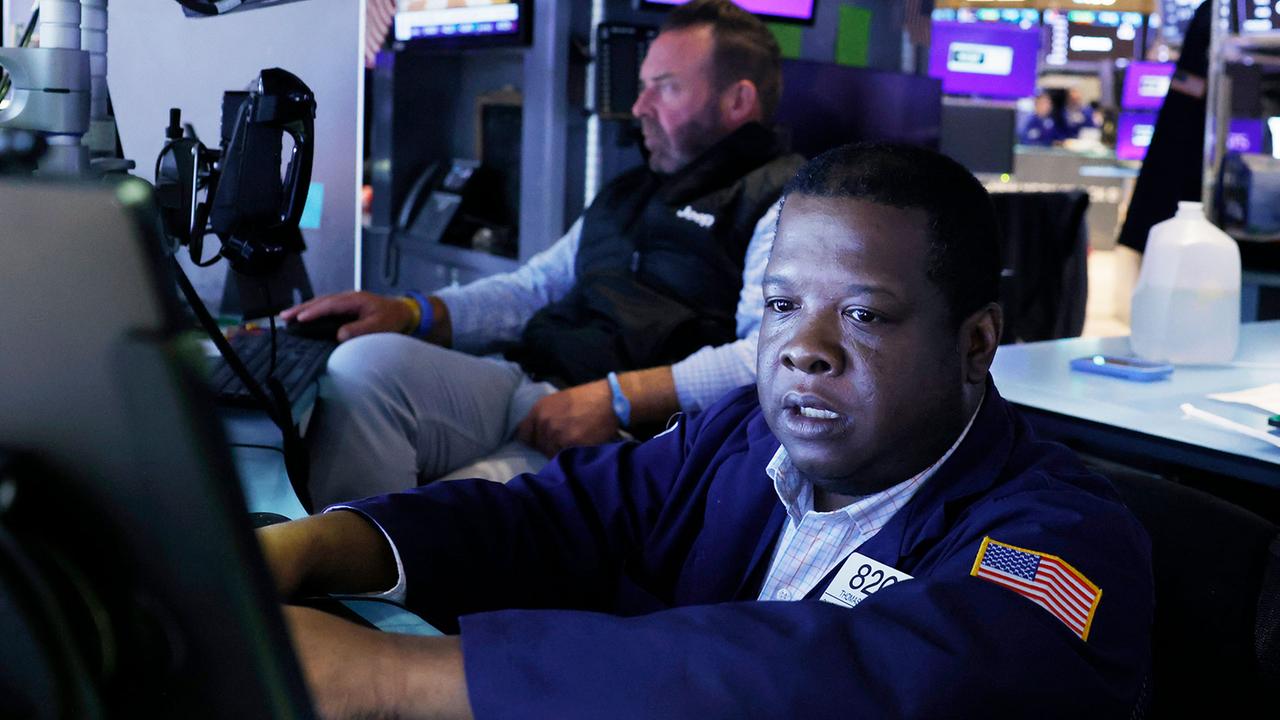market report
Weak labor market data have caused a sell-off on Wall Street. Fears of a recession have increased and major tech stocks have come under pressure.
On Wall Street, fears of an economic downturn accelerated the downward trend at the end of the week. A surprisingly slow increase in jobs and rising unemployment in July brought the issue of recession back onto the agenda. Industrial orders in June were also weak.
The recent weak economic data was grist to the mill for those who believe that the Federal Reserve has held on to its high interest rates for too long. Only on Wednesday, the bank had announced a rate cut in September. The day before, weak sentiment data from industry had already initiated the sell-off on the stock market.
In addition, the accelerating spiral of escalation in the Middle East and weak quarterly reports from the technology sector unsettled investors.
At the end of the day, all of the major Wall Street indices were clearly in the red. The leading index, the Dow Jones, lost 1.51 percent to 39,737 points and thus fell back below 40,000 points. The broad market S&P 500 index also trended significantly weaker, falling 1.84 percent to 5,346 points. The technology exchange Nasdaq suffered the biggest loss, losing 2.43 percent, while the Nasdaq 100 index fell 2.38 percent. The weakness of Wall Street had a broad impact today, and the European markets had also trended significantly weaker beforehand.
“Bad news is now really bad news,” commented chief market analyst Jochen Stanzl from broker CMC Markets. “The labor market data hits exactly the note that has put pressure on the stock market in recent trading days: the fear of a recession in the US economy later in the year.”
Specifically, far fewer jobs were created in the US labor market in July than expected. Only 114,000 new jobs outside of agriculture were added, according to the government's labor market report published this afternoon. Economists had expected 175,000, but this was revised downwards to 179,000 (originally 206,000) in the previous month.
The separately calculated unemployment rate rose unexpectedly to 4.3 percent in July. Economists had expected it to remain at the previous month's level of 4.1 percent. At the same time, wage growth has weakened. The ministry reported a month-on-month increase in hourly wages of 0.2 percent. Analysts had expected an increase of 0.3 percent. The Fed considers wage growth to be a key factor in assessing inflation trends.
“This suggests that the US Federal Reserve will be more concerned with the employment target than with the inflation target in the future,” said the Commerzbank economists.
Experts believe that an increase in jobs of around 100,000 per month is sufficient to provide jobs for the growing US working-age population. This means that the Fed's goal of cooling the economy but not sliding into a recession would be achieved.
“The number of newly created jobs can allay concerns about an imminent recession, but on the other hand cannot refute an economic slowdown. Job creation remains at a comparatively robust level, although job creation is no longer as high as in previous months,” commented Thomas Gitzel of VP Bank.
Headwinds for the Street also came from the disappointing quarterly figures from chip giant Intel and online retailer Amazon the previous evening. Intel shares fell dramatically by 26 percent, Amazon lost over ten percent in early trading, and ended the day down by 8.78 percent.
Intel's figures were particularly shocking; the company plans to cut 15,000 jobs and stop paying dividends.
Amazon's outlook was particularly disappointing. The world's largest online retailer forecast revenues of between 154 and 158.5 billion dollars for the current quarter. Analysts had on average expected a forecast of just over 158 billion dollars.
Headwinds for the domestic stock markets today came primarily from the USA. After weaker industrial sentiment in the USA had already caused fears of a recession the day before, the same tone continued today. Weaker than expected data from the labor market indicate that the US Federal Reserve (Fed) will soon cut interest rates in September, but at the same time fuel recession fears. The weak quarterly reports from the US technology sector also disappointed European investors.
This marks the perfect change of topic on the stock market, after months of discussion primarily focused on when the powerful US Federal Reserve would finally initiate a turnaround in interest rates. Added to this were disappointing quarterly results from the tech sector. Last but not least, the escalating situation in the Middle East is fueling investors' risk aversion.
This toxic US mixture was also difficult to digest for the domestic stock market today. Weaker economic data from Germany and the rest of the Eurozone have been nothing special for some time, but if the US economy also loses momentum, the fundamental prospects will become even more cloudy.
The DAX, which had already extended its slide yesterday afternoon, remained under heavy pressure today and fell below the 18,000 point mark again. In the end, the index collapsed by 2.31 percent to 17,661 points.
On Thursday, the German leading index had already closed at 18,083 points, close to its daily low. The DAX had only reached a high of 18,564 points the day before yesterday. On a weekly basis, this represents a significant loss of 4.1 percent. The European selection index EuroStoxx 50 also came under selling pressure, falling 2.6 percent, as did other European trading venues. The MDAX of medium-sized domestic stocks also lost significantly, falling 2.15 percent.
The previously favorable forecast for the stock markets could become more and more obsolete. “For a long time it looked as if a golden scenario was emerging for stocks: the economy was doing well and at the same time the central banks were lowering interest rates,” say the experts at Helaba. “Recently, doubts about this have increased.”
The DAX is now clearly weakened from a technical perspective – and the situation could become even more serious. After slipping below the 17,900 point mark, Jürgen Molnar from broker RoboMarkets now sees dynamic downward potential down to the 17,500 point mark.
In turn, the bond markets are rising, spurred by the prospect of falling US interest rates. The yield on ten-year US bonds fell significantly to 3.85 percent, while the yield on ten-year German government bonds fell to 2.17 percent.
Gold could be a beneficiary of the current flight movement on the stock markets. The price of a troy ounce of gold initially rose by as much as 0.9 percent to $2,468, thus coming significantly closer to its record high of $2,484. However, the price recently fell again.
Gold is receiving support from the increasing tensions in the Middle East, which means it is benefiting from its role as a safe haven, explains commodity expert Carsten Fritsch from Commerzbank. The yellow precious metal had already benefited in recent days from the increased interest rate cut expectations since the Fed meeting.
The euro is also one of the winners of the tectonic shifts on the capital markets today. The common currency rose sharply and was last worth 1.0915 dollars in US trading. In the morning, the common currency was still trading at 1.0790 dollars, roughly the same level as the previous evening. The European Central Bank set the reference rate at 1.0835 (Thursday: 1.0789) dollars.
According to a report by the industry service “PeakLoad”, the energy giant RWE wants to take a stake in the US utility Calpine. RWE is interested in a stake of up to 49 percent in the US company, reported “PeakLoad”. RWE had announced that it wanted to invest 55 billion euros worldwide in renewable energies, storage technologies, flexible generation and hydrogen projects by 2030.
The energy specialist service reported that investing in Calpine could advance this investment program. Calpine is active in the field of renewable energies. Calpine was taken over by financial investors six years ago. An RWE spokeswoman declined to comment on the report today. RWE shares came under pressure and ended up losing over seven percent. They were among the biggest losers in the DAX.
In the DAX, shares in chip company Infineon also plummeted. With a loss of more than five percent, they were among the biggest losers in the German leading index. Shares in chip industry supplier Aixtron and small caps such as Elmos Semiconductor and Kontron were also under pressure. The background to this was the disappointing quarterly figures from semiconductor pioneer Intel.
Volkswagen brand boss Thomas Schäfer is calling for increased cost-cutting measures in view of the increased costs and the increasing proportion of electric cars. “We must reduce our fixed costs even further in order to remain on course in this difficult market environment,” said Schäfer when presenting the business figures for the first half of the year.
Internet provider United Internet is reducing its forecasts for the full year. The reasons for this are primarily the after-effects of a temporary outage of the 1&1 mobile network at the end of May and additional non-period expenses for recalculations for network expansion for 2022 and 2023, the MDAX-listed company announced in the evening. Sales of around 6.4 (previously: 6.5) billion euros are now expected for the full year. Earnings (Ebitda) will be around 1.38 (1.42) billion euros.
In the first half of the year, the number of paid customer contracts rose by 330,000 to 28.78 million, it was also said. According to preliminary figures, sales rose by 2.8 percent to 3.0999 billion euros. The reason for the only moderate increase in sales was mainly the lower hardware sales compared to the previous year, especially smartphones, as well as lower aftermarket sales. EBITDA fell from 668.7 to 662.3 million euros in the first half of the year.
In the MDAX, shares were among the biggest losers. With a loss of over four percent, they fell to their lowest level since November. The British investment bank Barclays had previously given the shares an “underweight” rating. Analyst James Rowland Clark favors the British company Jet2.
According to media reports, national soccer player Niclas Füllkrug is close to moving from SDAX member Borussia Dortmund to England's West Ham United. The rumors intensified in the evening. The London club and BVB are said to have reached an agreement, reported the pay-TV channel Sky. Atlético Madrid and AC Milan were also recently named as interested parties.
…




